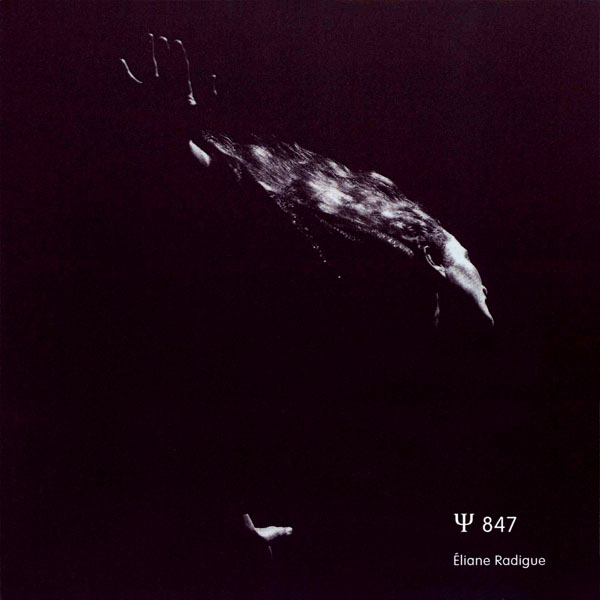
 |
|
 |
Format: do-CD Label & Cat.Number: Oral Rec. ORAL 57 Release Year: 2013 Note: FIRST EVER release of this work from 1972/1973, performed with the ARP synthesizer; contains studio & live version => "PSI 847 was her breakthrough piece - for the first time her musical conception was closely matched in execution over 80 minutes of sustained, gentle sound." hypnotic & trance-inducing, a must have if you are into minimal / early drone music !! Deluxe version with 24p. booklet, lim. 1000 copies
Price (incl. 19% VAT): €25.00 Warning: Currently we do not have this album in stock!
More Info"Long awaited first ever release of one of Éliane Radigue's masterpiece. She mentioned once that with PSI 847, she reached at that time exactly what she intended to do with the ARP synthetizer. Deluxe version with 2 CDs + 24 pages booklet, in French and English. Composition : Éliane Radigue. 1972. Interpretation : Lionel Marchetti. 2012. Textes : Lionel Marchetti, Thibaut de Ruyter. A short history of 847. 11.1972 - ARP 2500 Synthesizer on magnetic tapes. Produced at the composer's studio. Final mixdown at GMEB, Bourges. 02.1973 - First creation while in residence at the Electronic Music Studios of the University of Iowa. 31.01.2012 - Concert : Club Transmediale, Berlin. Interpretation Lionel Marchetti's interpretation with original magnetic tapes Direction : Éliane Radigue. 11.2012 - ORAL 57 : CD 1: Version concert. Live recording of the spatial interpretation by Lionel Marchetti. Stereophonic recording directed by Marcus Gammel (Deutschlandradio), mastered and remixed by Lionel Marchetti. CD 2: Version studio. Original magnetic tape, size 6/25, 19 cm/s, mastered by Lionel Marchetti, autumn 2012. 'The performance of PSI 847 is about to begin. Once again, Radigue has employed one of her favoured sound dissemination tricks: directing the banks of loudspeakers not toward the audience, but toward the buildingThe soundboard is at the rear of the house, and Marchetti will be playing the tapes from there. Radigue is in a seat, like any other audience member. There will be nothing to see, no one on stage, no visual distractions. But what happens when you listen to this music? What sensations, feelings or thoughts emerge? Obviously, any drone-based music generates, first of all, a physical experience You must give in, abandon yourself, forget about trying to figure out whether three minutes or an hour have elapsed. This is truly an experience of slowness. A rare moment for which you must prepare, and be in the right condition (no need to meditate, or try to achieve a trance state, either: a little concentration will suffice!) Once you've accepted the loss of physical bearings, you can then attempt to grasp Radigue's compositional talent: locating motifs that modulate and transform at varying intervals; appreciating the evolution, the appearance of a new movement, or, as in the case of PSI 847, the insensible dissolution of the music.' Thibaut de Ruyter, Berlin 2012." [label info]www.oral.qc.ca "Look up the Greek letter for Psi, and put that in front of 847. That's the title of this work, and how that came about is a silly story, dealing with one of the first 747 Boeing flights, a failing engine and how that reflected, and then misspelled 847 instead of 747. 'Psi 847' is a work composed by Eliane Radigue in 1972, using an 'Arp 2500 synthesizer on magnetic tapes'. She has performed this piece in various places ever since, but in January 2012 it was Lionel Marchetti who performed this piece, in the presence of the composer, who is by now an old lady, in Berlin. In the days before the concert, radigue was actively involved in placing the speakers, as this is not just a stereo phonic concert but more like something in which the speakers use the building as a soundboard. Now, that is of course is not easy to capture that spirit on to a recording, which reduces everything down to stereo again, but, phew, I must admit: what a fine disc. Music by Eliane Radigue is very slow moving, usually very drone like, very zen like if you will, but also at times working with these fine pure tones. Here in 'Psy 847' this works well. I am not sure how the mixing works, and what exactly Marchetti's role in this, but it sounds great. Not low humming deep end but certainly after forty minutes (of the total of seventy-three) quite high end and perhaps even loud - but once the applause sounds you hear the real volume of that and it seemed all rather soft. I think it's best to have this played at a rather soft volume in your space, sit back and let it all just flow over you. On the second disc we find a studio version of the same piece. I loaded both of them on my computer to spot the difference, but it was very hard to note the difference between the live and studio version. Marchetti stays very close to the original when it comes to playing it live, perhaps the material doesn't allow for much other interpretation? Or maybe Marchetti is an excellent performer, who more or less knows how to play the same thing again and again? The live version seemed a bit more edgy, the studio version a bit more smooth. But all of that is in the detail. Surely not something to play in one row, but rather to choose your own favorite and play that over and over again." [FdW/Vital Weekly] |
| © 2007 Drone Records | | Celler Strasse 33, 28205 Bremen, Germany | Privacy and cookies policy | Impressum / Allgemeine Geschaftsbedingungen / Haftungsausschluss | Links to the scene |